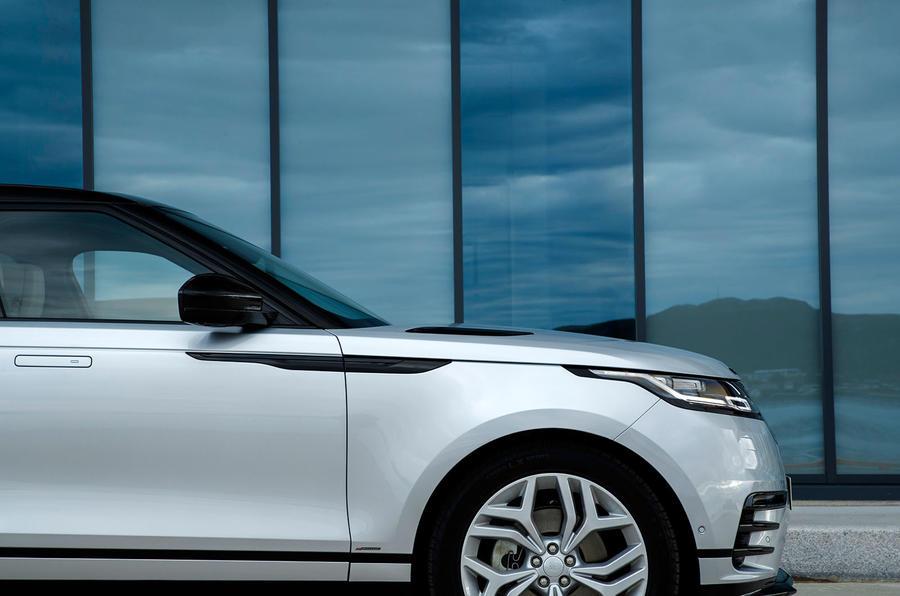Review: Range Rover Velar D240
How does the newest Range Rover cope with UK roads with its even newer 240PS four-cylinder 2.0-litre diesel?

When we first tried out JLR’s new Range Rover Velar, the mid-range SUV’s four-cylinder diesels didn’t make it to the overseas press launch.
Now, the Velar D240 has arrived in the UK, powered by JLR’s own-brand 2.0-litre, 237bhp four-cylinder twin-turbo Ingenium diesel engine. We’ve already sampled this engine in the new Land Rover Discovery, where it seemed very smooth and quiet, and in the Jaguar F-Pace SUV, where – despite sitting in practically the same platform as the Discovery – it didn’t seem as impressive.
We’ve also tried the 296bhp V6 diesel Velar. That’s a smashing engine, but it also makes the Velar pretty expensive. Knocking two cylinders off the diesel takes around £4000 off the price – but does it also knock holes in the performance and refinement? Given that you can find yourself paying close to £70,000 for a 2.0-litre diesel Velar, this is an important question, especially bearing in mind that Range Rover as a brand is more about comfort than Jaguar-type sportiness.
You can have your Velar suspension running on conventional steel (standard on the four-cylinder models) or air. We were hoping to give you an insight into what might be the better option, but our air-suspended test car quickly answered that. For a start, the option cost is only £1140, which doesn’t amount to a whole hill of beans in a £60-£70k package (the HSE is £64,160) that’s probably being paid for on a monthly basis. In exchange for that outlay you get superior control of body roll and levelling, adjustable height settings for loading, better ground clearance and wading depth off the roads, and potentially improved ride comfort on them.
Range Rover Velar D240
Show all 9On-road being very much the main stomping ground for the HSE trim that is already proving to be the most commonly picked Velar. HSE-standard wheels are 21-inchers, which gives you a big hint about likely usage. If you think you’ll be doing more off-roading, we’d recommend you look at the £10,000-cheaper S model with its more businesslike 19-inch five-spoke wheels. Have no fears about the Velar’s ability to make headway just about anywhere: even though modern Land Rovers don’t bother with lower range off-road gear ratios these days, the press launch showed it to be a class-leader in the slippery stuff.
When this 237bhp engine came out, there was some negativity about its refinement. JLR has done the right thing in listening to that rather than ignoring it. Not only is it difficult to tell how many cylinders it has, it’s difficult to hear it at all. Mid-range thrust provided by the D240’s double turbos is earnest and quietly administered by the 8-speed automatic gearbox
High gearing gives very relaxed motorway cruising and a very worthy 49.7mpg combined fuel economy figure, albeit at the expense of some immediacy in the car’s response to throttle inputs between 30 and 70mph. It feels a bit like the engine management system is resenting being awakened by a rude interruption from the driver. Leaving the transmission in Sport mode reduces that lag, but there’s no sign yet of any cure for the hesitancy away from rest that’s becoming a Land Rover trademark. That needs sorting.
The rest of the Velar proposition – lovely exterior styling, brilliantly-designed cabin with standard-setting quality, a peaceful and poised ride (with air springs, anyway) – is all present and correct. It’s a fine rolling testament of where Jaguar Land Rover is these days, and where it’s likely to be in the future. You can pay less for perfectly decent rivals, but few if any of them will match the Velar’s sense of style.
Spend some time on the Velar model and options list before you spend up to £85,000, however. The entry level price is £44,000. Choose wisely and you should be able to find one that does the job you need doing for around £60,000. And that choice could very well include some variant of the D240.
2017 Range Rover Velar D240 HSE
Price £64,160
Engine 4 cyls, 1998cc diesel
Power 237bhp at 4000rpm
Torque 369lb ft at 1500rpm
Gearbox 8-spd auto
Kerbweight 1841kg
Top speed 135mph
0-62mph 6.8sec
Fuel economy 49.7mpg (combined)
CO2 rating 154g/km, 32%
Rivals Porsche Macan, BMW X6
Tony Middlehurst is a writer for AutoCar.
Subscribe to Independent Premium to bookmark this article
Want to bookmark your favourite articles and stories to read or reference later? Start your Independent Premium subscription today.

Join our commenting forum
Join thought-provoking conversations, follow other Independent readers and see their replies